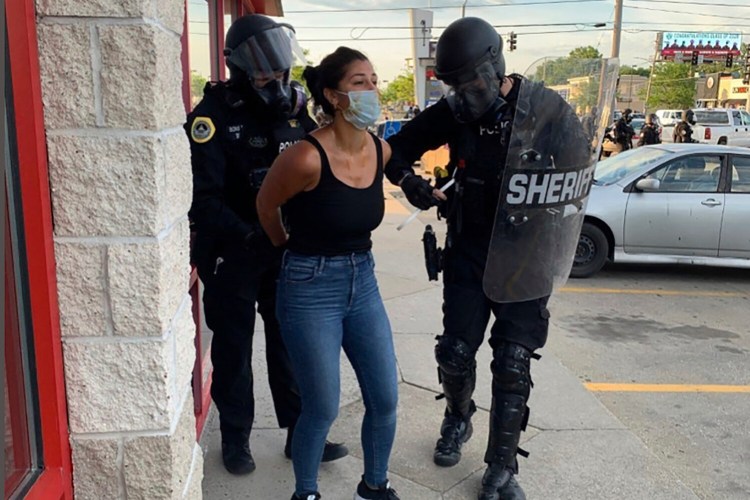Prosecutors in Iowa began their case Monday against a Des Moines Register reporter arrested during racial justice protests last summer, a rare trial of a U.S. journalist charged with a crime while reporting.
On May 31, Andrea Sahouri, a public safety reporter for the Register, had been covering protests sparked by the death of George Floyd. Police pepper-sprayed and arrested her and her then-boyfriend, Spenser Robnett. They were charged with failure to disperse and interference with official acts, misdemeanors that could lead to 30 days in jail.
In opening statements, prosecuting attorney Brecklyn Carey presented the case as a simple one, hinging on whether Sahouri and Robnett complied with an order to disperse and interfered with an arrest. She did not mention that Sahouri had been reporting – an element that has alarmed journalism experts.
“People will try to get your attention on something else,” she told the jury. “It is your job to keep your eye on the ball.”
Nick Klinefeldt, a former U.S. attorney representing the accused, said Sahouri’s arresting officer pepper-sprayed her even after she had identified herself as a journalist.
“This case is about a reporter who was arrested while doing her job,” Klinefeldt said in his opening statement. “She was assaulted.”
Authorities have said little in public about the case in the 10 months between Sahouri’s arrest and her trial, despite protests and demands for explanations from press-freedom advocates. Several major organizations have called on Polk County, Iowa, Attorney John Sarcone to drop the charges, including Amnesty International and more than 250 people affiliated with the Columbia University graduate school of journalism, from which Sahouri graduated.
“We strongly disagree with how this matter has been characterized and will do our talking in the courtroom,” Sarcone told the Register in August. On Monday, a spokesman for the Des Moines Police Department said he would have no comment until after the trial ends.
The First Amendment does not give special privileges to journalists to remain in nonpublic spaces, but many prosecutors have traditionally declined to pursue charges against reporters covering protests, said David Ardia, a University of North Carolina law professor who is co-director of its Center for Media Law and Policy. He called Sahouri’s case “a real head-scratcher,” and a break from “a custom that has been recognized by prosecutors and police departments all over the country … that it’s not in the public interest to prosecute journalists for doing their job.”
Police in Des Moines arrested nearly 80 people over the course of three days of demonstrations in May. Sahouri had been covering the saga.
On May 31, she reported on a peaceful event at a local park, then went to the nearby Merle Hay Mall, where things turned chaotic in the evening. She live-tweeted updates about looters breaking into a shoe store and posted photos of police using tear gas on crowds of people.
“She was there to be a witness and to record what was going on for history and for the community,” Des Moines Register Executive Editor Carol Hunter told The Washington Post. “And people in the community deserved to have her reporting on that protest.” Hunter worried that what happened to Sahouri will make other reporters in the state “fear that they have to be looking over their shoulder” when they cover similar events.
In a video Sahouri shot after her arrest, still sniffing from the pepper spray, she said the crowds tried to run away as police approached the mall. “I was saying, ‘I’m press, I’m press, I’m press,’ ” she said. “Police deliberately took me, pepper-sprayed me on my face and put me in zip ties.”
Journalists across the country were injured by police while covering last summer’s racial justice demonstrations. At least 126 were detained or arrested on the job that year – more than the previous three years combined, according to the U.S. Press Freedom Tracker. In most cases, charges were never filed or were dropped, but Sahouri and about a dozen other journalists face charges.
According to the tracker, the last journalist to face a trial was in 2018, when a reporter for a liberal news site covering a Republican candidate in Virginia was convicted of disorderly conduct.
In Des Moines, police arrested dozens of people during the demonstrations. According to the Register’s review of court records, Polk County eventually dismissed charges against at least 78 of them because of insufficient evidence or documentation of their arrests.
The police department said it would conduct an internal review after video showed police spray a different Register reporter in the eye after she identified herself as a reporter 17 times within 30 seconds.
Carlos Martínez de la Serna, program director for the Committee to Protect Journalists, said Sahouri’s case exemplified police mistreatment of American journalists. “It is ironic,” he said. “She was covering opposition against police brutality and she was subject to this type of harassment on the spot.”
For months, prosecutors refused to release footage of the Sahouri’s arrest to her attorney, saying it would be too costly to produce body-camera footage and that they did not need to release for a misdemeanor case. When a judge ordered the prosecution to turn over video and other evidence, police said the arresting officer, Luke Wilson with the Des Moines Police Department, had not hit a button to preserve the footage.
Klinefeldt asked a judge on Friday to dismiss the case, arguing that police could have retrieved the footage within days after the arrest. The judge declined but did order prosecutors to turn over materials used to train officers on body-camera usage.
The trial may conclude Tuesday.
Comments are not available on this story.
Send questions/comments to the editors.


